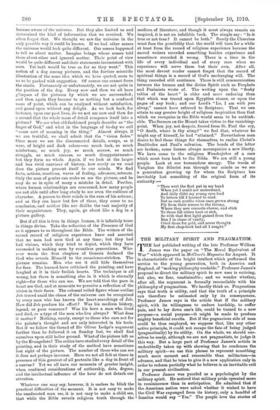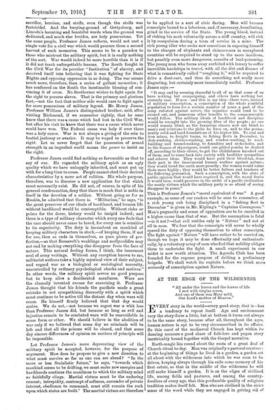THE MILITARY SPIRIT AND PRAGMATISM.
THE last published writing of the late Professor William James was the paper on " The Moral Equivalent of War" which appeared in McClure's Magasine for August. It is characteristic of the bright intellect which performed the service to the young generation, both in America and England, of "making philosophy readable." Professor James's proposal to divert the military spirit to new uses is enticing, but also, we fear, unattainable ; and we wonder whether, after all, the argument is formally reconcilable with his philosophy of pragmatism. We hardly think so. Pragmatism says that truth is utility, and that the truth of a principle can therefore be estimated only by its consequences. Professor James says in the article that if the military spirit, with its willingness to endure hardship, to suffer pain, and to lay down one's life, could be turned to a new purpose—a social purpose—it might be made to produce mighty beneficial results. But if the pugnacious side of man could be thus employed, we suppose that, like any other active principle, it could not escape the fate of being judged (pragmatically) by its utility. On the whole, we should our- selves be ready, although we are not pragmatists, to judge it this way. But a large part of Professor James's article is undoubtedly taken up with showing that he condemns the military spirit—we use this phrase to represent something much more earnest and reasonable than militarism—in advance, and that he tries to give it a new application only in order to redeem partially what he believes is an inevitable evil in our present civilisation.
Professor James was puzzled as a psychologist by the military spirit. He noticed that military pride operated more in reminiscence than in anticipation. He admitted that if the American nation were asked whether it wished to have the Civil War expunged from its history, only a handful of fanatics would say " Yes." The people love the stories of
sacrifice, heroism, and strife, even though the strife was fratricidal. And the burying-ground of Gettysburg, and ;Lincoln's haunting and beautiful words when the ground was dedicated, and much else besides, are holy possessions. Yet the same people, Professor James reflects, would not cast a single vote for a civil war which would procure them a second harvest of such memories. This seems to be a paradox to those who mistrust the military spirit, but it is really nothing of the sort. War would indeed be more horrible than it is if it did not teach unforgettable lessons. The South fought in the Civil War for its peculiar "Institution " of slavery, and deceived itself into believing that it was fighting for State Rights and opposing oppression in so doing. The war means much more, therefore, than a series of gallant memories ; it has conferred on the South the inestimable blessing of con- vincing it of error. No Southerner wishes to fight again for the right to possess slaves. That is the primary and glorious fact,—not the fact that neither side would care to fight again for more possessions of military legend. Mr. Henry James, Professor William James's distinguished brother, said, after visiting Richmond, if we remember rightly, that he once knew that there was a cause which had lost in the Civil War, but after his visit he knew that there was a cause which never could have won. The Federal cause was holy if ever there was a holy cause. War is not always a giving of the rein to bestial jealousy or avarice. It may be waged to preserve the right. Let us never forget that the possession of armed strength in an imperfect world means the power to insist on the right.
Professor James could find nothing so favourable as that to say of war. He regarded the military spirit as an ugly quality which we have unhappily inherited, and must put up with for a long time to come. People cannot shed their derived characteristics by a mere act of volition. His whole purpose, therefore, was to discover a new application for that which must necessarily exist. He did not, of course, in spite of his general condemnation, deny that there is much that is noble in itself in the devotion of a soldier. Without going so far as Ruskin, he admitted that there is. "Militarism," he says, "is the great preserver of our ideals of hardihood, and human life without hardihood would be contemptible. Without risks or prizes for the darer, history would be insipid indeed ; and there is a type of military character which every one feels that the race should never cease to breed, for every one is sensitive to its superiority. The duty is incumbent on mankind of keeping military characters in stock,—of keeping them, if not for use, then as ends in themselves, as pure pieces of per- fection,—so that Roosevelt's weaklings and mollycoddles may not end by making everything else disappear from the face of nature. This natural feeling forms, I think, the innermost soul of army writings. Without any exception known to me, militarist authors take a highly mystical view of their subject, and regard war as a biological or sociological necessity, uncontrolled by ordinary psychological checks and motives." In other words, the military spirit serves no good purpose but to keep alive a desiderated manliness. Wars are the clumsily invented excuse for exercising it. Professor James thought that his friends the pacifists made a great mistake in not sympathising discreetly with a spirit which must continue to be active till the distant day when wars will cease. He himself firmly believed that that day would arrive. We do not,—not because we regret war a whit less than Professor James did, but because so long as evil and injustice remain to be combated wars will be unavoidable in some form or other. We should believe in the abolition of war only if we believed that some day no criminals will be left and that all the prisons will be closed, and that some day sincere differences of opinion on matters of principle will be impossible.
Let Professor James's more deprecating view of the military spirit be accepted, however, for the purpose of argument. How does he propose to give a new direction to what must survive so far as one can see ahead P "In the more or less Socialistic future," he says, " towards which mankind seems to be drifting, we must make new energies and hardihoods continue the manliness to which the military mind so faithfully clings. Martial virtues must be the enduring cement; intrepidity, contempt of softness, surrender of private interest, obedience to command, must still remain the rock upon which states are built." The martial virtues are therefore to be applied to a sort of civic daring. Men will become conscripts bound to a laborious, and, if necessary, humiliating, grind in the service of the State. The young blood, instead of risking his neck voluntarily across a stiff country, will risk it by compulsion during a term of service in a mine. The rich young idler who seeks new sensations in exposing himself to the charges of elephants and rhinoceroses in unexplored countries will be required to stand up to the more insidious, but possibly even more dangerous, assaults of lead-poisoning. The young man who turns away surfeited with luxury to suffer incredible hardships in travel, with all the dirt and disease of what is romantically called "roughing it," will be required to drive a dust-cart, and thus do something not really more disgusting, but certainly more immediately useful. Professor James says :—
" It may end by seeming shameful to all of us that some of us have nothing but campaigning, and others have nothing but unmanly ease. If now—and this is my idea—there were, instead of military conscription, a conscription of the whole youthful population to form for a certain number of years a part of the army enlisted against nature, the injustice would tend to be evened out, and numerous other benefits to the commonwealth would follow. The military ideals of hardihood and discipline would be wrought into the growing fibre of the people ; no one would remain blind, as the luxurious classes now are blind, to man's real relations to the globe he lives on, and to the perma- nently solid and hard foundations of his higher life. To coal and iron mines, to freight trains, to fishing fleets in December, to dish-washing, clothes-washing, and window-washing, to road- building and tunnel-making, to foundries and stoke-holes, and to the frames of skyscrapers, would our gilded youths be drafted off, according to their choice, to get the childishness knocked out of them, and to come back into society with healthier sympathies and soberer ideas. They would have paid their blood-tax, done their part in the immemorial human warfare against nature ; they would tread the earth more proudly ; the women would value them more highly ; they would be better fathers and teachers of the following generation. Such a conscription, with the state of public opinion that would have required it, and the moral fruits it would bear, would preserve in the midst of a pacific civilization the manly virtues which the military party is so afraid of seeing disappear in peace."
This is Professor James's "moral equivalent of war." A good example, as some of our readers will be sure to remember, of a rich young cub being disciplined in a "fishing fleet in December " is given in Mr. Kipling's " Captains Courageous."
Manes pugnacity and sense of opposition are to be enrolled in a higher cause than that of war. But the assumption is fatal —is it not ?—that evil resides only in " Nature " and not at all in man. We fear that the conscripts will never he wholly spared the duty of opposing themselves to other conscripts. The fight against " Nature " will have rather to be carried on, though we hope it may be done effectually and enthusiasti- cally, by a voluntary army of men who feel that nobility obliges them to undertake the fight. A. small experiment in our midst is now worth attention. The Agenda Club has been founded for the express purpose of drilling a preliminary brigade. We shall watch its exploits before we think more seriously of conscription against Nature.







































 Previous page
Previous page